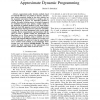Free Online Productivity Tools
i2Speak
i2Symbol
i2OCR
iTex2Img
iWeb2Print
iWeb2Shot
i2Type
iPdf2Split
iPdf2Merge
i2Bopomofo
i2Arabic
i2Style
i2Image
i2PDF
iLatex2Rtf
Sci2ools
CDC
2010
IEEE
2010
IEEE
Pathologies of temporal difference methods in approximate dynamic programming
Approximate policy iteration methods based on temporal differences are popular in practice, and have been tested extensively, dating to the early nineties, but the associated convergence behavior is complex, and not well understood at present. An important question is whether the policy iteration process is seriously hampered by oscillations between poor policies, roughly similar to the attraction of gradient methods to poor local minima. There has been little apparent concern in the approximate DP/reinforcement learning literature about this possibility, even though it has been documented with several simple examples. Recent computational experimentation with the game of tetris, a popular testbed for approximate DP algorithms over a 15-year period, has brought the issue to sharp focus. In particular, using a standard set of 22 features and temporal difference methods, an average score of a few thousands was achieved. Using the same features and a random search method, an overwhelmingl...
Related Content
| Added | 13 May 2011 |
| Updated | 13 May 2011 |
| Type | Journal |
| Year | 2010 |
| Where | CDC |
| Authors | Dimitri P. Bertsekas |
Comments (0)

